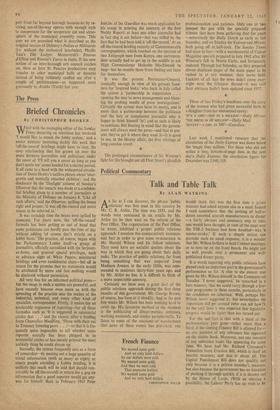The Press
Briefed Chronicles
By CHRISTOPHER BOOKER
WHAT with the managing editor of the Sunday Times declaring on television last weekend 'I would like to smash the lobby system,' and a senior minister muttering darkly this week that 'off-the-record' briefings might have to stop, the cosy relationship that has grown up over the years between journalists and politicians under the cover of 'I'll tell you a secret so long as you don't quote me' seems headed for a stormy period. It all came to a head with the widespread circula- tion of Denis Healey's tactless phrase about 'over- grown and mentally retarded children'; and the disclosure by the 'Daylight' column of Sunday's Observer that the remark was made at a confiden- tial briefing given to a number of journalists at , the Ministry of Defence on January 8. 'Like all such affairs,' said the Observer, spilling the beans right and proper, 'it was off-the-record and never meant to be referred to.'
It was certainly time the beans were spilled by someone. For years now, the 'off-the-record' formula has been getting so out of hand that some politicians can hardly pass the time of day without adding 'of course that's strictly on a lobby basis.' The practice, of course, began with the Parliamentary Lobby itself—a group of journalists, officially accredited with the Scrjeant- at-Arms, and granted special privileges, such as advance sight of White Papers, ministerial briefings and even confidential chats—but all in return for the promise that no statements would be attributed by name and that nothing would be disclosed without permission.
All very fine for an informed political press— but the snags in such,a system arc powerful, and have recently become even more so with the spreading of the practice into the realms of the industrial, technical, and every other kind of specialist, correspondent. Firstly, it makes for an intolerable vagueness of reporting—for all those formulae such as 'It is suggested in ministerial circles that . . .' and the classic, after a briefing from Chancellor Maudling, 'Those with their car to Treasury listening posts . .'—so that it is fre- quently quite impossible to tell whether some reporter actually has been plugged in to ministerial circles or has merely printed the most unlikely thing he could dream up.
Secondly, the system frequently acts as a form of censorship—by passing out a huge quantity of trivial information (with as many as eighty or ninety people attending a Lobby briefing, it is unlikely that much will be said that should con- ceivably be off-the-record) in return for a gag on information that a good reporter would get any- way for himself. Back in February 1963 Peter
Jenkins of the Guardian was much applauded for his scoop in printing the contents of the first Neddy Report; at least one other journalist had in fact dug it out before—but was stifled by the fact that he had been told it 'off-the-record.' At an off-the-record briefing recently of Commonwealth correspondents, which touched on the ejection of two Telegraph men from Kenya, one correspon- dent actually had to get up in the middle to ask High Commissioner Malcolm MacDonald to stop—lest he muzzle them from finding out facts for themselves.
It was the present Postmaster-General, ironically enough in view of his present fond- ness for 'inspired leaks,' who back in July called the system a 'partnership in suppression . . . opening the way to news management and blunt- ing the probing needle of press investigations.' Certainly the system does have its merits, and is more than a partnership between the politician and the lazy or complacent journalist who is happy to think himself 'in'; and as such is likely to continue. But bearing in mind that the govern- ment will always need the press—and that at pre- sent they've got it where they want it—it is good to see, in the Healey affair, the first stirrings of long overdue revolt.
* The prolonged circumstances of Sir Winston's fight for life brought out all Fleet Street's ghoulish
professionalism and patience. Only one or two jumped the gun with the specially prepared tributes that have been gathering dust for years —notoriously the Daily Sketch as early as last Saturday, and on Sunday the Express and Mirror, both going off at half-cock. The Sunday Times had most to lose—with a warehouseful of Colour Magazine specials prepared in July 1962 after Sir Winston's fall in Monte Carlo, and fortunately undated. Through last Saturday, as they prepared eleven duplicate pages of the main paper to be rushed in at any moment, their nerve held. Luckiest of all that the news didn't come over- night were the Glasgow Herald—it was said their obituary hadn't been updated since 1937.
Three of last Friday's headlines over the story of the woman who had given successful birth to
a daughter from her abdominal cavity: • 'IT'S A GIRL—ONE IN A MILLION'—Daily Mirror. 'THE BIRTH IN 60 MILLION'—Daily' Mail. 'HAYLEY—A GIRL IN 500'—Guardian.
* Last week I mentioned rumours that the circulation of the Daily Express was down below the 'magic four million.' For those who did not notice a tiny, bottom-of-page item in the next day's Daily Express, the circulation figure for December was 3,940, 519.






































 Previous page
Previous page